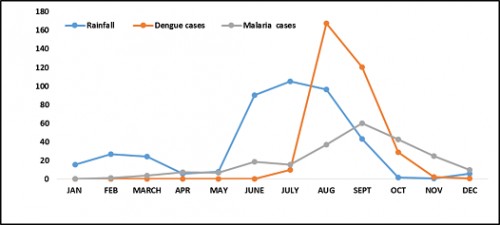Vol. 5, Issue 5, Part A (2018)
Mosquito borne diseases and Sanitation in Ghaziabad district, Uttar Pradesh, India
Author(s): Alka Rani, Abhishek Gupta, BN Nagpal and Sucheta Shah Mehta
Abstract: Rapid urban growth has led to lack of basic amenities among which sanitation has influenced health of people. This has effected mosquito breeding and hence transmission of various mosquito borne diseases. Study area Ghaziabad district, Uttar Pradesh, is facing rapid population growth and sanitation problems hence influence mosquito breeding. In selected PHCs mosquito breeding sites were identified as polluted and unpolluted. This study shows that polluted breeding sites and sewerage has become ideal breeding site for mosquitoes like Culex and some species of Anopheles. Water storage increased breeding of Aedes mosquito in man-made breeding sites. Analysis of health data shows that Ghaziabad is at risk of diseases. Malaria is decreasing while dengue is increasing in Ghaziabad due to availability of breeding places of their mosquito vectors. Culex quinquefasciatus, a vector of Japanese encephalitis and lymphatic filariasis and An. subpictus, recently described as vector of malaria are breeding profusely and may be responsible for emergence of these diseases in Ghaziabad.
Related Graphics: Click here for more related graphics

Fig.: Relationship of dengue and malaria with rainfall from 2011-2015
Pages: 25-30 | 1776 Views 341 Downloads

How to cite this article:
Alka Rani, Abhishek Gupta, BN Nagpal, Sucheta Shah Mehta. Mosquito borne diseases and Sanitation in Ghaziabad district, Uttar Pradesh, India. Int J Mosq Res 2018;5(5):25-30.







